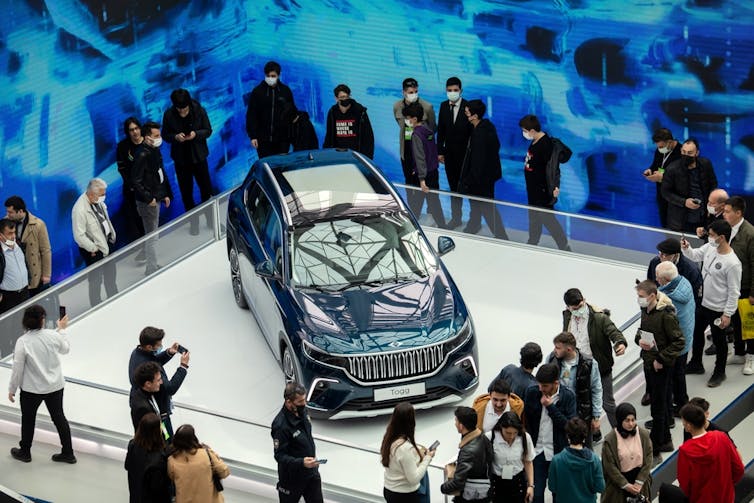President Recep Tayyip Erdoğan has ruled Turkey for the last 21 years. In the first few terms of his rule, Turkey experienced significant economic growth and a reduction in inequality. This was widely believed to be a reason for Erdoğan’s long-term popularity.
However, inflation hit a 24-year high of 85.5% in November 2022, creating speculation that economic instability would count against Erdoğan in the 2023 general election.
Despite this, in the first round of the election Erdoğan attracted 49.5% of the vote. Some argued that what Erdoğan calls his “great achievements” in science and technology were a significant reason for his continued popularity.
In the weeks before the first round, Erdoğan made a flurry of announcements about his “great achievements” and upcoming projects. He unveiled plans for Turkey to send its first astronaut to the International Space Station by the end of the year. The Teknofest Aerospace and Technology Festival was held to showcase many of these projects to the public. Erdoğan also showed off Turkey’s new multipurpose amphibious assault ship and a new Turkish armed drone, capable of taking off from aircraft carriers.
Erdoğan clearly hoped that these announcements would boost his popularity, by creating an image of Turkey becoming a world leader in science and technology. Erdoğan’s government also oversaw the country’s Black Sea natural gas pipeline project, an attempt to make Turkey energy independent. And more than £55 billion had been invested in the national defence industry as part of a plan to make Turkey a world leader in defence products.
Creating Turkey’s own car
Although the car industry has had an important role in Turkey’s economy, it has been dominated by foreign car companies. But the idea of having a national car brand has had a long history. In 1961 the military government attempted to develop the first Turkish car, Devrim, as a symbol of modern Turkey, but it was not very successful. This desire for a Turkish national car was even made into a popular film.
In 2017, Erdoğan invited six business groups to produce a 100% domestic and national car by 2023, a year that marked the 100th anniversary of Turkey’s republic as well as being an election year.
The six business groups and the ministry of science, technology and industry formed Türkiye’s Automobile Joint Venture Group (Togg) in 2019, aiming to build the first fully Turkish-made car, which was also going to be an electric vehicle. Togg received the highest support package believed to have been given to any automotive firm in Europe and North America (about £2.8 billion).

Despite the extensive financial support and hype, the Togg car could not be “100% domestic and national” because domestic suppliers didn’t have the capacity to make the key parts. Crucial complex and expensive components, such as the battery, had to be imported.
In the end, only 51% of the Togg car was domestically sourced. This led to a change in the way it was described, rather than a “100% domestic and national” car Erdoğan began calling it “the car of Türkiye” and claimed the product as a Turkish industrial win.
Social costs
With political economists Gabor Scheiring and Tamas Gerocs I have been investigating the implications of the policies related to Turkey’s car industry on social and economic development. Policy interventions that led to the development of Togg and Erdoğan’s other “achievements” came at the expense of workers. Changes during the Erdoğan years made subcontracting legal for big firms, resulting in more insecure and low-paid employment.
The number of unionised workers in the car industry dropped from 68% to just 17% between 2003-23. Labour rights abuses were reported in Togg’s plant.
Most people in Turkey are unable to afford to buy a new average car, let alone the Togg car, which will be sold for Turkish lira 953,000 (£38,500). This is about 112 times the minimum wage. More than 70% of workers in Turkey earn the minimum wage or less.
Togg received extensive public support despite its inability to keep the promise of a 100% Turkish car and deteriorating working conditions. In a survey, 94% of the population supported the initiative and this support was primarily based on nationalist and patriotic grounds, such as “helping one’s own country”.
The car was portrayed as a major success that would add “success to Turkey’s list of ongoing achievements”. Erdoğan described Togg as the “shared pride of Türkiye and 85 million people”. The businesses involved in Togg were declared “brave fellows”.
Even supporters of the opposition were in favour of Togg and criticised opposition leader Kemal Kılıçdaroğlu for not showing enough support for such an important initiative.
Rallying nationalist support
It is no surprise that Erdoğan’s “great achievements” were at the centre of his election campaign. Just days before the first round, Erdoğan drove around in the first Togg car to get media coverage. He said the car “will hit the roads of Europe with all of its models” soon and the Europeans “will say ‘crazy Turks’ are coming”.
The government has created an understanding that every Turk must work “hard to elevate the country to the level of developed civilizations”. Low pay and insecure employment are the sacrifices workers must make for their country to reach this goal. Those who die in work accidents such as the mining disaster in Soma are called martyrs.
However, without being able to turn around the economy, Erdoğan’s projection of Turkish success and place in the world would seem to have been a winner.
Merve Sancak does not work for, consult, own shares in or receive funding from any company or organisation that would benefit from this article, and has disclosed no relevant affiliations beyond their academic appointment.
This article was originally published on The Conversation. Read the original article.







